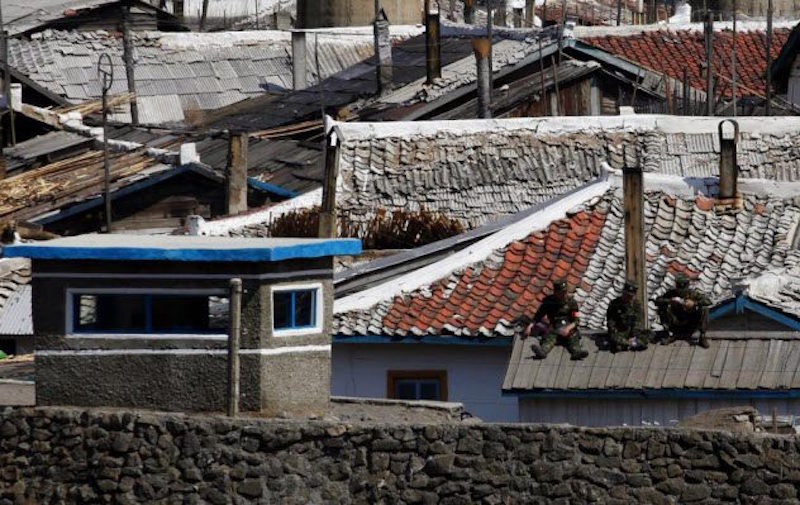Keeping up with the news is hard. So hard, in fact, that we’ve decided to save you the hassle by rounding up the most significant, unusual, or just plain old mind-blowing stories each week.
As we marched toward Christmas, the world seemed to be just itching to give us some major news. A terrorist nearly caused untold chaos in New York. An interstellar asteroid may have been a piece of alien technology. North Korea might have hit the brink of collapse.
Each of those stories hovered on the cusp of being major news and then ultimately fell short (thankfully, in the case of the attempted NYC attack). It may be that the world is gearing up for some big news over the holidays. Or it may be that the really big stories were happening elsewhere.
10. Alabama Elected Its First Democratic Senator In 25 Years
From our partners:
Until this week, the conventional wisdom was that you could dress a pig in a red rosette and it would still win in Alabama. Well, the Republican Party came close to trying just that.
Roy Moore was the GOP’s pick to contest the Senate seat vacated by Jeff Sessions, and boy, was Moore controversial. An antigay, anti-Muslim firebrand outsider, he terrified the Republican National Committee almost as much as he delighted the party’s populist wing.
When he defeated establishment pick Luther Strange in the primaries, everyone considered his election to the Senate a done deal. Democratic nominee Doug Jones was running as a sacrificial lamb.
Which just goes to show how little we’ve learned from the last few election upsets. Jones beat Moore by 1.5 percentage points. In doing so, he became the first Democratic senator that Alabama has elected in a quarter of a century.
Moore was a uniquely flawed candidate, embroiled in a string of sexual assault scandals. On the other hand, Jones was a highly respected lawyer who made his name successfully prosecuting Klansmen. Nonetheless, Moore’s loss suggests that the Republican civil war hasn’t been won by the populists just yet.
9. Scientists Scanned An Interstellar Asteroid For Signs Of Alien Tech
Remember Oumuamua? About three weeks ago, we introduced you to the first interstellar object ever found in our solar system. A strange, cigar-shaped asteroid about 10 times longer than it was wide, Oumuamua looked like nothing we’d ever seen in nature.
This week, some scientists decided that might be because it wasn’t natural at all. As Oumuamua drifted away from Earth, the billionaire-funded Breakthrough Listen project conjectured that maybe—just maybe—the asteroid was really an alien probe.
On Wednesday afternoon EST, they trained the world’s largest movable radio telescope on it. The Green Bank Telescope could detect someone using a cell phone on Jupiter. If there’s any alien tech operating on Oumuamua, we’ll soon know.
As of late Thursday, the initial results from Breakthrough Listen don’t show that Oumuamua is an alien spacecraft. Chances are it’s just a weirdly shaped asteroid. But the final results and analysis aren’t in. This may yet be the moment when we humans finally learn for certain that we are not alone.
8. China May Have Begun Preparing For North Korea’s Imminent Collapse
China is just about the only friend that North Korea has left in the world. When China makes a move concerning the Hermit Kingdom, it’s worth paying attention. This week, a leak from a state telecom company managed to get out to the wider media. It suggested that Beijing may be building a vast network of refugee camps on the China–North Korea border in preparation for the Kim regime’s imminent collapse.
It’s possible to read everything into this move or nothing at all. President Trump and Kim Jong Un have been embroiled in a war of words for weeks now that keeps threatening to spill over into an actual war. In a DPRK versus USA matchup, there would be horrific casualties on all sides but only one winner. (Hint: It’s not North Korea.) For China not to be preparing for a refugee influx would be dangerously cavalier.
On the other hand, China is starting to flex its muscles on the world stage. Beijing was recently implicated in the coup that deposed Zimbabwean dictator Robert Mugabe. Are the Chinese planning to take care of Kim themselves? It seems unlikely, but who knows?
7. France Was Declared Complicit In The Rwandan Genocide
The Rwandan genocide is one of the biggest orgies of killing the world has ever seen. In spring 1994, Hutu extremists slaughtered over 800,000 Tutsis and moderate Hutus in just 100 days. Entire villages were burned. Churches were filled with thousands of people and bulldozed. Songs celebrating the murder of Tutsis were played on the radio while government ministers publicly read lists of addresses of those targeted for extermination.
Given the scale of the slaughter, it’s long been thought that the Hutu extremists had outside help in the shape of France. French was the language of the Hutu elite, and France had armed the Hutus’ militias for decades. When the genocide actually kicked off, Tutsi staff at French centers and embassies were deliberately left to die (including one assistant who was forced to watch as the embassy’s dog was given the seat he’d assumed was for him).
Those rumors may not stay rumors much longer. This week, a report by a US law firm, commissioned by Kigali, found that the French government was responsible for arming the killers and later preventing genocide perpetrators from being brought to justice. France denies the charges.
6. We Made Huge Leaps In Curing Two Awful Diseases
Huntington’s disease and hemophilia A are two things you never want your doctor to say you have. The former is like a combination of Alzheimer’s, Parkinson’s, and motor neuron disease while the latter means that even the smallest injury can leave you bleeding endless quantities of blood. Both are horrible, and both have resisted all attempts to cure them.
Well, not anymore. This week, medical science got a double breakthrough bonanza. On Monday, researchers in London announced that an experimental drug had succeeded in stopping the development of Huntington’s. On Thursday, a completely separate set of researchers based in London announced the first successful gene therapy trial for people with hemophilia A. If both make it through the trial stage, they could improve life for millions of people.
The Huntington’s development has been called the biggest breakthrough in any field of neuroscience for about 50 years, the hemophilia. A trial isn’t quite such big news, but it’s still an astounding scientific advance. Together, they ignite hope that many other incurable diseases may one day turn out to be curable after all.
5. British Columbia Discovered The 13th Severed Foot On Its Shoreline
On Wednesday, British Columbia residents might have been startled if they took a walk to a certain part of the coastline. A severed human foot was lying on the beach, still clad in a sneaker. But it wouldn’t just have been walking into the opening scene of a new bleak crime drama that would have shocked locals. It’s the fact that this foot is the 13th human foot to wash ashore in BC in the past decade.
As far as stories go, they don’t come much creepier than this. Starting in summer 2007, severed feet have regularly turned up on BC’s beaches in varying states of decay. At first, they were suspected to be remains from an airplane crash. Then people began to wonder if organized crime was to blame for a sudden, gruesome killing spree.
Today, our best guess is that all the feet are the results of accidental drownings and suicides and the currents just happen to be washing them all onto a single stretch of BC coastline.
While the official version is generally accepted, it seems likely that this new foot washing ashore will fan the flames of conspiracy theories. If nothing else, it’ll spark plenty of ghoulish conversations over the holidays.
4. Burundi’s Government Played With Fire
Nestled just under Rwanda, Burundi is a tiny African nation that emerged just over a decade ago from the shadow of a bruising civil war. Between 1993 and 2005, 300,000 Burundians were killed in an ethnic conflict between Tutsis and Hutus. The war finally ended when President Pierre Nkurunziza came to power and a new constitution was ratified. One of the strict provisions of that constitution was a two-term limit on the presidency.
In 2015, President Nkurunziza removed those limits and won a third term. Burundi instantly plunged back into unrest, with up to 2,000 dying in election violence. This week, President Nkurunziza followed up a government pledge to rewrite the constitution entirely, allowing him to stay in power until 2034.
While the changes will be put to a referendum in 2018, Nkurunziza has already made his first move. A new national tax will be levied on everyone to support his 2020 reelection campaign. It’s feared that this enforced taxation will spark yet more violence.
Burundi has been teetering on the brink for two years now. Hundreds of thousands have fled into neighboring Tanzania, and government militias are still carrying out ethnic murders in rural areas. Onto this tinderbox, Nkurunziza has just cast a lit match.
3. The FCC Voted On Net Neutrality
Net neutrality is a cornerstone of the modern Internet. It forces service providers like Comcast, Verizon, and AT&T to—to use a technical term—not act like total jerks. At the moment, these companies can’t choose to block certain websites, can’t offer faster loading speeds for extra money, and basically have to act as impartial custodians of the data flowing into your house. It’s the concept that has underpinned the entire Internet. And now, all that may be about to change.
On Thursday, the FCC voted on removing net neutrality rules brought in under President Obama. President Trump supported removing the rules. As the committee is split 3-2 in favor of Republicans, no one started the day expecting anything but a total repeal.
Activists have said that ending net neutrality could allow your provider to charge you an extra $10 a month to ensure you have enough bandwidth for, say, Netflix to play movies properly. It could also allow big players like Google and Facebook to create monopolies. In effect, it could end the Internet as we know it.
2. New York City Got Lucky
On Halloween this year, an ISIS-inspired killer rammed a truck into cyclists near New York City’s Hudson River, killing eight. It was the first successful Islamist attack on the city since 9/11. On Monday, we nearly saw a second. Twenty-seven-year-old Akayed Ullah strapped a pipe bomb to his chest and wandered into a crowded underground passageway between the Times Square subway and the Port Authority Bus Terminal. Surrounded by people, he detonated the device.
The potential was there for another Manchester Arena bombing, at least in terms of casualties. Luckily, Ullah turned out to be an incompetent terrorist. Like the Parsons Green tube bomb in London this September, his device failed to fully explode. Instead, it partly detonated, badly injuring Ullah and hurting four other people. For a bombing of a busy transit point in one of the busiest cities on Earth, this was a minor miracle.
The failed attack confirms that one of the best weapons we have against terrorism is the terrorists’ incompetence. Like the Chelsea and New Jersey bombings in 2016, what could have been a massacre wound up killing no one.
1. We Discovered Burma’s Rohingya Crisis Was Worse Than We Thought
Medecins Sans Frontieres (MSF) is one of the most respected aid agencies on Earth. Also known as Doctors Without Borders, it won the Nobel Peace Prize for its lifesaving work in countries like Bosnia, Rwanda, and Liberia. When they call something a humanitarian crisis, they know what they’re talking about.
Which is what makes their new report this week on the Rohingya crisis in Burma (aka Myanmar) so disturbing. In August, the Buddhist army began an ethnic cleansing campaign against the Muslim minority Rohingya. Hundreds of thousands have fled over the border into Bangladesh, but lack of access means we’ve had to rely on Burmese estimates of only 400 killed.
The MSF report suggests that this tally is not even close. The organization estimates a minimum of 6,700 Rohingya died in the first month of the crisis alone.[10]
Among the dead are an estimated 730 children under five. These kids were alternately shot, burned alive, beaten to death, or killed by landmines. The scale of the violence is incredible. If the MSF estimates are correct, then more people have died in Burma in the last couple of months than have been killed all year in Somalia’s brutal civil war.
The ICC is now said to be looking at prosecuting crimes against humanity in Burma. Whether this threat will in any way stem the current tide of bloodshed remains to be seen.
This feature originally appeared in Listverse.

























